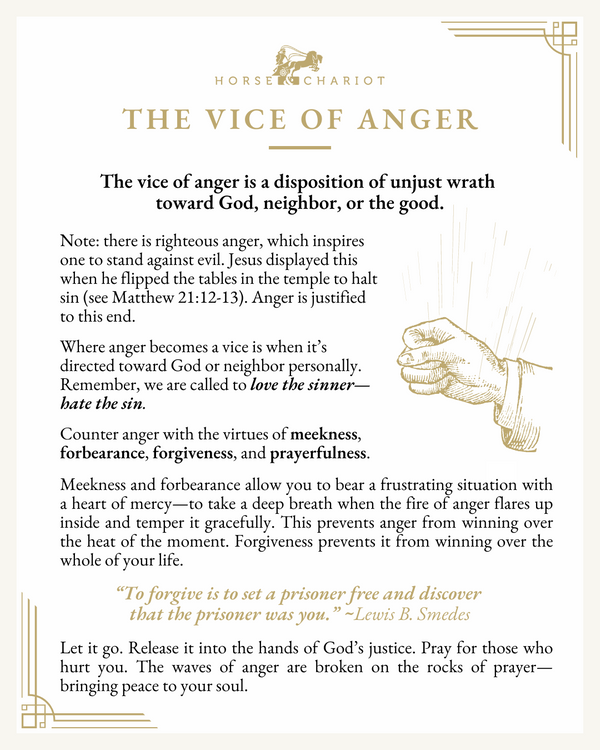All Series > Seven Chiefly Vices > Part 3
The Vice of Anger
Teaching of Virtue
Watch: On YouTube
The Vice of Anger
Out of pride and envy arise the bitterness of anger.
The vice of anger is a disposition of unjust wrath toward God, neighbor, or the good.
There is righteous anger, which inspires one to stand against evil. Jesus displayed this when he flipped the tables in the temple to halt sin (see Matthew 21:12-13). Anger is justified to this end.
Anger becomes a vice when it’s directed toward God or neighbor personally. Remember, we are called to love the sinner—hate the sin.
Unjust anger makes one short-tempered, short-sighted, ill-willed, and unforgiving. Whether held in thought, expressed in action, held in brief, or for years on end—its weight is crippling to the soul—often leading to hatred of the people who create the anger, and, eventually, hatred of God who creates the people.
Counter anger with the virtues of meekness, forbearance, forgiveness, and prayerfulness.
Meekness and forbearance allow you to bear a frustrating situation with a heart of mercy—to take a deep breath when the fire of anger flares up inside and temper it gracefully. This prevents anger from winning over the heat of the moment. Forgiveness prevents it from winning over the whole of your life.
“To forgive is to set a prisoner free and discover that the prisoner was you” (Lewis B. Smedes). Let it go. Release it into the hands of God’s justice.
Pray for those who hurt you. The waves of anger are broken on the rocks of prayer—bringing peace to your soul.

Scroll down for the related scriptures, quotes, and lesson plan associated with this teaching.
Copyright © 2022 Horse & Chariot. All rights reserved.
Visual Resource

Related Scripture
Example of rightly ordered, and controlled, anger toward evil: “Then Jesus entered the temple and drove out all who were selling and buying in the temple, and he overturned the tables of the money changers and the seats of those who sold doves. He said to them, ‘It is written, My house shall be called a house of prayer’; but you are making it a den of robbers.” — Matthew 21:12-13 (NRSV-CE)
Example of rightly ordered, and controlled, anger toward evil: “Be angry but do not sin; do not let the sun go down on your anger, and do not make room for the devil.” — Ephesians 4:26-27 (NRSV-CE)
“A fool gives full vent to anger, but the wise quietly holds it back.” — Proverbs 29:11 (NRSV-CE)
“Whoever is slow to anger has great understanding, but one who has a hasty temper exalts folly.” — Proverbs 14:29 (NRSV-CE)
“A soft answer turns away wrath, but a harsh word stirs up anger.” — Proverbs 15:1 (NRSV-CE)
“Those who are hot-tempered stir up strife, but those who are slow to anger calm contention.” — Proverbs 15:18 (NRSV-CE)
“Make no friends with those given to anger, and do not associate with hotheads, or you may learn their ways and entangle yourself in a snare.” — Proverbs 22:24-5 (NRSV-CE)
“One given to anger stirs up strife, and the hothead causes much transgression.” — Proverbs 29:22 (NRSV-CE)
“One who is slow to anger is better than the mighty, and one whose temper is controlled than one who captures a city.” — Proverbs 16:32 (NRSV-CE)
“Fools show their anger at once, but the prudent ignore an insult.” — Proverbs 12:16 (NRSV-CE)
“One who is quick-tempered acts foolishly, and the schemer is hated.” — Proverbs 14:17 (NRSV-CE)
“Refrain from anger, and forsake wrath. Do not fret—it leads only to evil.” — Psalms 37:8 (NRSV-CE)
“Do not be quick to anger, for anger lodges in the bosom of fools.” — Ecclesiastes 7:9 (NRSV-CE)
“But now you must get rid of all such things—anger, wrath, malice, slander, and abusive language from your mouth.” — Colossians 3:8 (NRSV-CE)
"Anger and wrath, these also are abominations, yet a sinner holds on to them." — Sirach 27:30 (NRSV-CE)
“Those with good sense are slow to anger, and it is their glory to overlook an offense.” — Proverbs 19:11 (NRSV-CE)
“You must understand this, my beloved: let everyone be quick to listen, slow to speak, slow to anger; for your anger does not produce God’s righteousness.” — James 1:19-20 (NRSV-CE)
“But I say to you, Love your enemies and pray for those who persecute you.” — Matthew 5:44 (NRSV-CE)
“Bear with one another and, if anyone has a complaint against another, forgive each other; just as the Lord has forgiven you, so you also must forgive.” — Colossians 3:13 (NRSV-CE)
"Whenever you stand praying, forgive, if you have anything against anyone; so that your Father in heaven may also forgive you your trespasses.” — Mark 11:25 (NRSV-CE)
"Let no evil talk come out of your mouths, but only what is useful for building up, as there is need, so that your words may give grace to those who hear. And do not grieve the Holy Spirit of God, with which you were marked with a seal for the day of redemption. Put away from you all bitterness and wrath and anger and wrangling and slander, together with all malice, and be kind to one another, tenderhearted, forgiving one another, as God in Christ has forgiven you." — Ephesians 4:29-32 (NRSV-CE)
“But I say to you that if you are angry with a brother or sister, you will be liable to judgment; and if you insult a brother or sister, you will be liable to the council; and if you say, ‘You fool,’ you will be liable to the hell of fire.” — Matthew 5:22 (NRSV-CE)
“Beloved, never avenge yourselves, but leave room for the wrath of God; for it is written, ‘Vengeance is mine, I will repay, says the Lord.’ No, ‘if your enemies are hungry, feed them; if they are thirsty, give them something to drink; for by doing this you will heap burning coals on their heads.’ Do not be overcome by evil, but overcome evil with good.” — Romans 12:19-21 (NRSV-CE)
“But the fruit of the Spirit is love, joy, peace, forbearance, kindness, goodness, faithfulness, gentleness and self-control. Against such things there is no law.” — Galatians 5:22-23 (NIV)
"For if the righteous man is God's child, he will help him, and will deliver him from the hand of his adversaries. Let us test him with insult and torture, so that we may find out how gentle he is, and make trial of his forbearance.” — Wisdom 2:18-19 (NRSV-CE)
"Whom God put forward as a sacrifice of atonement by his blood, effective through faith. He did this to show his righteousness, because in his divine forbearance he had passed over the sins previously committed;" — Romans 3:25 (NRSV-CE)
Related Quotes
“To forgive is to set a prisoner free and discover that the prisoner was you.” — Lewis B. Smedes
Rightly ordered anger toward evil: “A vigorous temper is not altogether an evil. Men who are easy as an old shoe are generally of little worth.” — Charles Spurgeon
Rightly ordered anger toward evil: "I never work better than when I am inspired by anger; for when I am angry, I can write, pray, and preach well, for then my whole temperament is quickened, my understanding sharpened, and all mundane vexations and temptations depart.” — Martin Luther
Rightly ordered anger toward evil: “Anybody can become angry, that is easy; but to be angry with the right person, and to the right degree, and at the right time, and for the right purpose, and in the right way, that is not within everybody’s power, that is not easy.” — Aristotle
“He who cannot forgive breaks the bridge over which he himself must pass.” — George Herbert
“The best guarantee against anger is to let it happen before you act.” — St. John Bosco
“When anger rises, think of the consequences.” — Confucius
“When you feel ‘dog tired’ at night, it may be because you growled all day.” — Unknown
“Anger is never without a reason, but seldom a good one.” — Benjamin Franklin
“If you are patient in one moment of anger, you will escape a hundred days of sorrow.” — Rainer Maria Rilke
“If you do not wish to be prone to anger, do not feed the habit; give it nothing which may tend to its increase.” — Epictetus
“Uncontrolled temper is soon dissipated on others. Resentment, bitterness, and self-pity build up inside our hearts and eat away at our spiritual lives like a slowly spreading cancer.” — Jerry Bridges
“No form of vice, not worldliness, not greed of gold, not drunkenness itself, does more to un-Christianize society than evil temper. For embittering life, for breaking communities, for destroying the most sacred relationships, for devastating homes, for withering up men and women, for taking the bloom off childhood; in short, for sheer gratuitous misery-producing power, this influence stands alone.” — Henry Drummond
“Pride is one chief cause of undue anger. It is because men are proud, and exalt themselves in their own hearts, that they are revengeful, and are apt to be excited, and to make great things out of little ones that may be against themselves. Yea, they even treat as vices things that are in themselves virtues, when they think their honor is touched, or when their will is crossed. And it is pride that makes men so unreasonable and rash in their anger, and raises it to such a high degree, and continues it so long, and often keeps it up in the form of habitual malice… If men sought not chiefly their own private and selfish interests, but the glory of God and the common good, then their spirit would be a great deal more stirred up in God’s cause than in their own; and they would not be prone to hasty, rash, inconsiderate, immoderate, and long-continued wrath, with any who might have injured or provoked them; but they would in a great measure forget themselves for God’s sake, and from their zeal for the honor of Christ. The end they would aim at, would be, not making themselves great, or getting their own will, but the glory of God and the good of their fellow-beings.” — Jonathan Edwards
“Nothing makes room for Satan more than wrath.” — Thomas Manton
“Do not say, “I cannot help having a bad temper." Friend, you must help it. Pray to God to help you overcome it at once, for either you must kill it, or it will kill you. You cannot carry a bad temper into heaven.” — C. H. Spurgeon
“Some well-meaning counselors may say that you need to ‘forgive God’ for the things you have endured. Yet never in Scripture are we asked to forgive God. God has not wronged us. God is ultimately the only truly wronged party, as He is the only One who is truly innocent. It is we who have sinned against Him. In His graciousness, He has chosen to pay the penalty for our sins Himself and save us. If you are holding on to anger against the Lord, let His grace melt your bitterness. Only in submission to Him will you find peace.” — Charles Swindoll
“Be not angry that you cannot make others as you wish them to be, since you cannot make yourself as you wish to be.” — Thomas a Kempis

Lesson Plan
For your family, small group, or personal reflection.
STEP 1: Introduction
Example: "I'm going to play a short video on the topic of the vice of anger. After the video, I have some questions to gather your thoughts and get the discussion started. We’ll then wrap up with a closing prayer."
STEP 2: Watch Video (or listen)
Watch (or listen to) the video of the teaching (cast to your TV via YouTube). If time allows, also read the teaching, related Scriptures, and related quotes.
STEP 3: Discussion / Reflection
- The vice of anger is a disposition of unjust wrath toward God, neighbor, or the good. There is also righteous anger, which inspires one to stand against evil. What are some examples of righteous anger (virtue)? What are some examples of unjust anger (vice)?
- In your own words, what does it mean to “love the sinner, hate the sin?”
- What can you do in your life to counter anger and grow in the virtues of meekness and forbearance (humble patience to temper the fires of anger when they flare up inside)?
- Think of people from your life who have hurt you. Have you forgiven them? Do you pray for them and their salvation? Keep in mind, forgiving someone does not condone what they’ve done; it simply means you have canceled the debt they owe you to make it right; have surrendered your desire to think, speak, or act angrily toward them (even if they deserve it), and have fully released them into the hands of God for justice to be served.
- What is an example from your life where anger got the best of you? What lessons did you learn?
- Did any of the related Scriptures or quotes stand out to you (please elaborate)?
- Any other thoughts you’d like to share?
STEP 4: Wrap Up & Closing Prayer
Summarize and wrap up the discussion. Then, conclude with a sincere and humble prayer from the heart.

Join one of our free online training events.
Shop all our teachings of virtue prints.
Explore other virtue-based products.
Never miss a teaching — get all new teachings of virtue sent to your inbox free!



